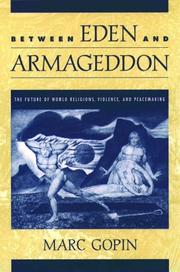| Listing 11 - 16 of 16 | << page >> |
Sort by
|
Book
ISBN: 9783170208186 3170208187 Year: 2009 Volume: 100 Publisher: Stuttgart: Kohlhammer,
Abstract | Keywords | Export | Availability | Bookmark
 Loading...
Loading...Choose an application
- Reference Manager
- EndNote
- RefWorks (Direct export to RefWorks)
Economics --- Industrial management --- Rational choice theory --- Christianity --- Religious aspects --- Economic aspects --- 262 --- 262 Kerkelijk bestuur. Kerkelijke organisatie. Kerkelijke instellingen --- Kerkelijk bestuur. Kerkelijke organisatie. Kerkelijke instellingen --- Social choice --- Business administration --- Business enterprises --- Business management --- Corporate management --- Corporations --- Industrial administration --- Management, Industrial --- Rationalization of industry --- Scientific management --- Management --- Business --- Industrial organization --- Economic theory --- Political economy --- Social sciences --- Economic man --- Christianity and economics --- Religious aspects&delete& --- Economics - Religious aspects - Christianity --- Industrial management - Religious aspects - Christianity --- Rational choice theory - Religious aspects - Christianity --- Christianity - Economic aspects
Book
ISBN: 9400711522 9400711530 Year: 2011 Publisher: Dordrecht : Heidelberg : Springer Science,
Abstract | Keywords | Export | Availability | Bookmark
 Loading...
Loading...Choose an application
- Reference Manager
- EndNote
- RefWorks (Direct export to RefWorks)
The book - which was originally published by Kluwer in 2004 - is a collection of scholarly papers focusing on the role of spirituality and ethics in renewing the contemporary management praxis. The basic argument is that a more inclusive, holistic and peaceful approach to management is needed if business and political leaders are to uplift the environmentally degrading and socially disintegrating world of our age. The book uses diverse value-perspectives (Hindu, Catholic, Buddhist, and Humanist) and a variety of disciplines (philosophy, ethics, management studies, psychology, and organizational sciences) to extend traditional reflections on corporate purpose and focuses on a self-referential organizational-existential search for meaning, identity and success.
Business ethics -- Congresses. --- Leadership -- Moral and ethical aspects -- Congresses. --- Leadership -- Religious aspects -- Congresses. --- Management -- Moral and ethical aspects -- Congresses. --- Management -- Religious aspects -- Congresses. --- Social responsibility of business -- Congresses. --- Commerce --- Management --- Business & Economics --- Vocational Guidance --- Local Commerce --- Management Theory --- Business ethics --- Leadership --- Social responsibility of business --- Religious aspects --- Moral and ethical aspects --- Administration --- Business. --- Ethics. --- Business and Management, general. --- Ability --- Command of troops --- Followership --- Industrial relations --- Organization --- Deontology --- Ethics, Primitive --- Ethology --- Moral philosophy --- Morality --- Morals --- Philosophy, Moral --- Science, Moral --- Philosophy --- Values --- Trade --- Economics --- Industrial management --- Management science. --- Quantitative business analysis --- Problem solving --- Operations research --- Statistical decision
Book
ISBN: 9781527513129 1527513122 9781527518285 1527518280 Year: 2018 Publisher: Newcastle upon Tyne: Cambridge scholars,
Abstract | Keywords | Export | Availability | Bookmark
 Loading...
Loading...Choose an application
- Reference Manager
- EndNote
- RefWorks (Direct export to RefWorks)
In his historical satirical novel Candide, Voltaire (François-Marie Arouet) presented a fanciful vision of the Jesuit missions established among the Guaraní in parts of what today are Argentina, Paraguay, and Brazil. Some scholars have characterized the missions as having been a socialist utopia, or an independent republic located on the fringes of Spanish territory in South America. What was the reality? This study presents a detailed analysis of one of the Jesuit missions, Los Santos Mártires del Japón, and the story of the creation of mission communities on a frontier contested by Spain and Portugal during the seventeenth and eighteenth centuries. It documents the historical realities of the Jesuit missions, their patterns of development, and the demographic consequences for the mission populations of military conflict
Conflict management --- #GBIB: jesuitica --- 271.5-9 --- 271.5-9 Jezuïeten: missies --- Jezuïeten: missies --- Religious aspects --- Jesuit --- Missions --- History. --- Catholic Church. --- Church of Rome --- Roman Catholic Church --- Katholische Kirche --- Katolyt︠s︡ʹka t︠s︡erkva --- Römisch-Katholische Kirche --- Römische Kirche --- Ecclesia Catholica --- Eglise catholique --- Eglise catholique-romaine --- Katolicheskai︠a︡ t︠s︡erkovʹ --- Chiesa cattolica --- Iglesia Católica --- Kościół Katolicki --- Katolicki Kościół --- Kościół Rzymskokatolicki --- Nihon Katorikku Kyōkai --- Katholikē Ekklēsia --- Gereja Katolik --- Kenesiyah ha-Ḳatolit --- Kanisa Katoliki --- כנסיה הקתולית --- כנסייה הקתולית --- 가톨릭교 --- 천주교 --- Religious aspects. --- History --- Catholic Church --- Missions - Japan - History --- Conflict management - Religious aspects

ISBN: 1280473177 9786610473175 019803069X 1282367021 9786612367021 0195348079 1423756924 9780198030690 9781423756927 9780195348071 0195157257 9780195157253 019513432X 9780195134322 0197738354 Year: 2000 Publisher: Oxford: Oxford university press,
Abstract | Keywords | Export | Availability | Bookmark
 Loading...
Loading...Choose an application
- Reference Manager
- EndNote
- RefWorks (Direct export to RefWorks)
Marc Gopin offers an analysis of contemporary religious violence as a reaction to the pressures of modernity and the increasing economic integration of the world. He contends that religion is now one of the most likely causes of massive violence.
Pacific settlement of international disputes. --- Peace --- Violence --- Violence (in religion, folklore, etc.) --- Peace (Theology) --- Religion and peace --- Prayers for peace --- Dispute settlement, Peaceful (International relations) --- Disputes, Pacific settlement of international --- International disputes, Pacific settlement of --- Pacific settlement of international disputes --- Peaceful dispute settlement (International relations) --- Peaceful settlement of international disputes --- PSD (Pacific settlement of international disputes) --- Settlement of international disputes, Pacific --- Dispute resolution (Law) --- International relations --- Religious aspects. --- Moral and religious aspects --- Law and legislation --- Violence - Religious aspects - Christianity --- Conflict management - Religious aspects - Christianity --- Dispute resolution (International law) --- Pacific resolution of international disputes --- Peaceful dispute resolution (International relations) --- Peaceful resolution of international disputes --- Resolution of international disputes, Pacific --- International law --- Conflict management
Book
ISSN: 13730274 ISBN: 9782804184001 2804184005 Year: 2014 Volume: *40 Publisher: Bruxelles: De Boeck,
Abstract | Keywords | Export | Availability | Bookmark
 Loading...
Loading...Choose an application
- Reference Manager
- EndNote
- RefWorks (Direct export to RefWorks)
Et si on pouvait soigner l’entreprise (baisse des ventes, baisse de la qualité, conflictualité...) comme un corps humain, par la médecine traditionnelle chinoise (MTC d’entreprise) ? Et si on pouvait motiver les salariés, par l’adhésion à un projet supérieur et fédérateur ? Et si on pouvait manager par l’harmonie, et par un supplément de sens et d’utilité ? Et si on pouvait améliorer la performance globale (innovation, collaboration, ouverture au changement, productivité...) et la pérennité des entreprises, par les enseignements de la sagesse taoïste et de la nature (Taoïsme d’entreprise) ? Et si les nouveaux modèles d’entreprise occidentaux préfiguraient la " Tao-entreprise " de demain ? Et si les entreprises prenaient leur « part du monde » pour œuvrer à la fabrication d’une société meilleure ? Voilà quelques questions auxquelles répond la " Tao-entreprise " à l’aide d’exemples et de cas concrets. Innovante, décapante, elle rebat les cartes de ce que l’on prenait pour des évidences, en abordant de nouveaux concepts de la sociologie des organisations, en apportant aux décideurs et aux managers des outils ou des concepts inédits et opérationnels comme le Business-sens, la Pyramide du Tao-Projet, leSmart-Tao, la Tao-gouvernance, la Taorganisation, le Tao-management, le modèle POOC, la synergétique, l « harmonance », l « écolistique », le Tao-business grid, etc. À bout de souffle et sans boussole, nos économies concurrentielles et mondialisées ont besoin de nouveaux repères, nos entreprises de nouveaux leviers de performance, nos salariés de nouvelles raisons de se motiver. La " Tao entreprise " se propose de les aider à trouver ces nouvelles clés, à ouvrir de nouvelles voies à partir de la nature bienveillante et performante qui sommeille en chaque homme et en chaque décideur.
Agilité dans l'entreprise --- Bedrijfsbeheer --- Business administration --- Business entreprises--Management --- Change [Organizational ] --- Changement dans l'organisation --- Changement organisationnel --- Corporate culture --- Corporations--Management --- Culture [Corporate ] --- Culture d'entreprise --- Culture d'organisation --- Culture de l'organisation --- Culture organisationnelle --- Développement organisationnel --- Employee motivation --- Entreprise [Culture d' ] --- Entreprises--Gestion --- Flexibilité organisationnelle --- Gestion d'entreprise --- Industrial administration --- Industrial management --- Innovation organisationnelle --- Institutional culture --- Management [Industrial ] --- Motivation au travail --- Motivation du personnel --- Motiveren van het personeel --- Mémoire d'entreprise --- Mémoire de l'organisation --- Mémoire organisationnelle --- Organisatie--Wijzigingen --- Organisatiecultuur --- Organisation -- Changement --- Organization development --- Organizational change --- Organizational culture --- Organizational development --- Organizational innovation --- Personeel -- Motiveren --- Personnel -- Motivation --- Rationalization of industry --- Scientific management --- Tao --- Way --- Personnel --- Motivation --- Management --- Taoism --- Philosophy --- Psychological aspects --- Religious aspects --- Management - Philosophy --- Management - Psychological aspects --- Management - Religious aspects - Taoism

ISBN: 0521795087 0521791510 1107121531 9786610430000 0511175140 0511018827 0511155298 0511328761 0511613075 1280430001 0511046804 9780521795081 9780511018824 9780511155291 9780521791519 9780511613074 9780511046803 Year: 2002 Publisher: Cambridge : Cambridge university press,
Abstract | Keywords | Export | Availability | Bookmark
 Loading...
Loading...Choose an application
- Reference Manager
- EndNote
- RefWorks (Direct export to RefWorks)
Religion, Theology and the Human Sciences explores the religious consequences of the so-called 'end of history' and 'triumph of capitalism' as they have impinged upon key institutions of social reproduction in recent times. The book explores the imposition of managerial modernity upon successive sectors of society and shows why many people today feel themselves to be oppressed by systems of management that seem to leave them no option but to conform. This culture has spread through education, health and social services and has been welcomed by the churches. Richard Roberts seeks to challenge and outflank such seamless, oppressive modernity, through reconfiguration of the religious and spiritual field. This volume will be of use to a range of students in humanities and social sciences (particularly theology and the sociology of religion) and should become standard reading for those concerned with the practical application of contemporary theology in a postmodern world.
Religion and sociology --- Management --- Capitalism --- History --- Religious aspects --- Social aspects --- -Godsdienst en cultuur: algemeen --- #SBIB:316.331H340 --- 316:2 --- 316:2 Godsdienstsociologie --- Godsdienstsociologie --- Religion and society --- Religious sociology --- Society and religion --- Sociology, Religious --- Sociology and religion --- Sociology of religion --- Sociology --- Administration --- Industrial relations --- Organization --- Market economy --- Economics --- Profit --- Capital --- Godsdienst en cultuur: algemeen --- Arts and Humanities --- Religion --- Religion and sociology - History - 20th century. --- Management - Religious aspects - History - 20th century. --- Capitalism - Religious aspects - History - 20th century. --- Religion and sociology - Great Britain - History - 20th century. --- Management - Social aspects - Great Britain - History - 20th century. --- Capitalism - Social aspects - Great Britain - History - 20th century. --- religion, theology and the human sciences --- the 'end of history' --- the 'triumph of capitalism' --- managerial modernity --- education, health, social services and religion --- reconfiguration of the religious and spiritual field
| Listing 11 - 16 of 16 | << page >> |
Sort by
|

 Search
Search Feedback
Feedback About UniCat
About UniCat  Help
Help News
News